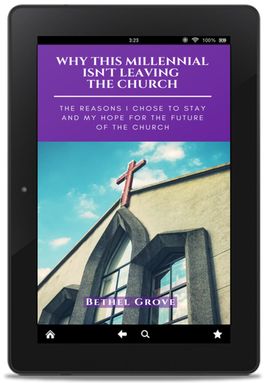|
Three years ago, I went to a meeting that terrified me but completely changed my life. This is the story of how I learn to "run toward the roar" in the wake of my dad losing his ministry and nearly losing mine too. I was challenged to forgive, I found a new calling, and I gained loyal friends to support me. I hope this video inspires you to run toward the roar. To read my review the book Through the Eyes of a Lion, click here [Review of Chase the Lion coming soon] To read more about my story, click here If this encourages or inspires you, please share with someone who could use this encouragement and use the hashtag #runningtowardtheroar
0 Comments
To be honest, I’m getting a little tired of all the articles, blog posts, videos, and books that are titled something along the lines of – “Why Millennials Are Leaving the Church” or “How To Get Millennials to Stay in the Church.” But I’m even more tired of blog posts written by millennials titled something like “Eight Problems in Church Today and How We Can Fix Them.” Some of the most popular Christian spoken word videos fall into this category, blaming the church by blaming “religion” or blaming our elders for creating the problems that exist in the church's traditions today. Although two of the most popular (“Why I Hate Religion but Love Jesus” by Jefferson Bethke and “A Godless Generation” by Jon Jorgenson) are written by guys that I really like and respect, I don’t agree with some of what they are saying. Although I am well aware that my generation as a whole seems to be more prone to walk away from the faith they were raised in, I don’t think most of these articles or the rants on YouTube are really helping us arrive at the best solution to the problem. What usually ends up happening is a vicious cycle of the older generation blaming the younger generation for blaming the older generation, and it keeps going around and around. In the end, neither side proves their point or demonstrates Christ’s love in the process. 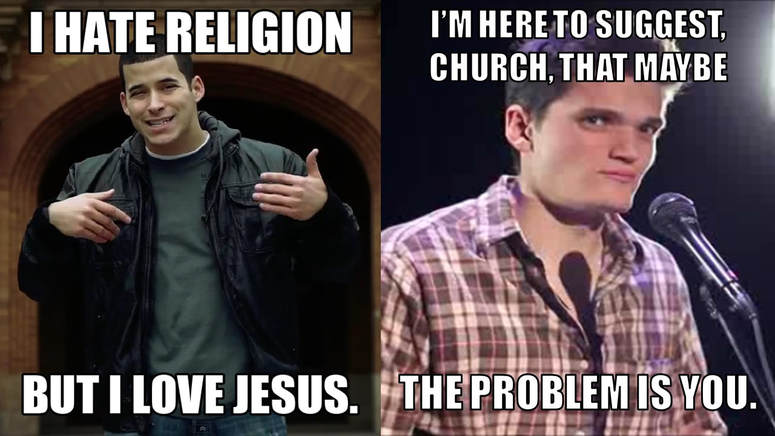 [Disclaimer: I love and respect Jeff and Jon a lot. In fact, I've met both of them in person and they are great guys. They inspire me to do most of what I do online today. However, I do see the fault in some of their logic. Nothing I say about them here is meant to be demeaning or insulting to them or their fans. I'm just sharing truth as I understand it. This got me thinking about myself and those in my generation that have stayed faithful to the church into our adulthood. I find it funny that many of them are contributing to these debates more than anyone else at times. I admit that there may have been a time in my early college years when I might have sided with my generation, and I highly agreed with what my peers are saying. But since I've graduated college, I've come to value the opinions of the older generations as I have heard it explained by my parents or grandparents. So in the end, I want to attempt to take the middle road to help both sides find understanding and peace. Unlike most of the articles written in this discussion, I want to give you the list of reasons I chose to stay in the church, which will hopefully help everyone understand what all of us can do to help bring my generation back in. Here we go: 1) I Was Taught The Basic Reasoning Behind My Faith Last year, I went through the Bible study for the book Not A Fan by Kyle Idleman with a small group from my church. Although by the end of the study I saw so many of Kyle's viewpoints as being strongly millennial in their nature, one point he made stood out from the rest. In the video curriculum for this study, Kyle was taking about parents that were asking him about why their adult children had left the faith when they had grown up. Most of then didn’t seem to understand why this happened, since they raised their children in the church. But one father was different from the others when he talked his estranged daughter. After explaining the story of his daughter walking away from her faith, this father realized, “We raised her in the church, but we didn’t raise her in Christ.” This story really stuck out to me as I think back to many of the kids I went to Christian school with. Out of 50-60 kids I was in high school over the years (a rough estimate, averaging 35-40 per year), there are less than half of then that I can confirm that they are still living out their faith (give or take a few). Less than a third of us went to Christian colleges. Less than 5 of us made the choice to pursue ministry as a career. I know all too many of this same group that have left the church, rejected Christianity, and are living for themselves in their lifestyle choices. And those that fall in between, they don’t live their lives in such a way that they stand out for their faith. That’s sad. What I think is different for me from many young people of my generation is that I was taught from a young age the reason for the hope that I have. This goes far beyond learning your Bible stories in Sunday school or memorizing Scriptures because you are required. It even goes beyond knowing that Jesus died for your sins. This is having a basic understanding of proper apologetics, or defense of the faith. It’s knowing that there is proof that Jesus did die for your sins and then rose again, and any life that is lived outside of that knowledge and the salvation found there is incomplete. 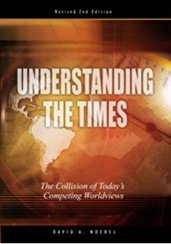 My senior year of high school, we were required to take an apologetics-type class through David Noebel’s curriculum, Understanding the Times, which evaluated the most popular worldviews today, including Islam, Secular Humanist, Marxism, Cosmic Humanism (New Age), and Post Modernism. We compared all of these world views against the logistics of the Christian worldview in 10 different areas: theology, philosophy, ethics, biology, psychology, sociology, law, politics, economy, and history. Through this study, I observed that from a logistical standpoint the Christian worldview the most complete and precise of all worldviews. Every other worldview has huge holes in it when examined closely, and the people that uphold those worldviews are almost always contradicting themselves in some way, shape, or form in order to hold onto their beliefs. This study taught me the reasoning behind my faith. There were several classes I took in college and a number of books I read that did the same thing, chief among would be The Case for Christ by Lee Strobel. Through the author’s investigative journey, we learn that when the evidence for Christ’s death and resurrection are examined closely, it honestly takes more faith to hold on to atheism that it does to accept Christianity. This is the kind of thing we need to be teaching the kids of this generation. Am I saying that every teenager needs to take a college level apologetics course? No, but I am saying that we have to find ways to teach kids how to defend their faith, not just know what the popular Bible stories are and how to memorize Bible verses. They have to know that what happened in the Bible is true and it changes everything. Most of those kids I went to school with could probably still tell you the details of certain Bible stories, but many of them never took it to heart because they did not understand from a logistical standpoint why they needed to hold onto their faith. That made them susceptible to being deceived by worldviews that are full of holes. They rejected the truth because they didn’t know why it was the truth in the first place. This is what we must avoid if we want to keep my generation in the church. We have to stop just raising kids in the church, but we need to raise this generation in the knowledge that Christ did indeed die and rise again for our salvation. 2) I Was Taught That Truth Is ObjectiveBecause post-modernism is so prevalent in our culture today, more and more people are believing that truth is subjective to the individual. Truth is relative and never absolute. That is what the majority of what our world believes or is being convinced to believe, whether they realize it or not. Unfortunately, with the way our education and political systems are set up today, this is being presented as the best and superior worldview. Not only do they treat every other worldviews as inferior and unintelligent, but their methods end up indoctrinating those of us that aren’t on our guard against it. That’s where most Christians are. They’ve been taught the Bible stories, but they aren’t fully convinced that everything in the Bible is true in light of the competing views they are being presented on a daily basis. Soon, they start to question things like if God really did create the world in six literal days or Paul’s teaching on women being allowed to teach in worship assemblies. These things aren’t salvation issues (which is another discussion for another time), but when they start to question those issues in this way, they then have license to question the integrity of God’s word as a whole. The next thing you know, they have disregarded God’s word entirely, because they never believed it was absolutely true in the first place. From the time I was a child, I was taught that truth is truth, and God’s word is the physical representation of truth itself. We can and should believe in everything it says, and trust God’s wisdom as it has been revealed to us in the Bible. We shouldn’t question its validity and try to reinterpret it to fit our needs. If any of us do struggle with doubt, then we should do our research into the sources that will help us verify the truth. When we know it to be the truth, we need to take it as it is and live by it. It breaks my heart to see so many that have been raised in the church that either walk away from the faith they once professed or if they stay in the faith are much too liberal in their interpretation of the Bible, because they read the Bible subjectively, just like the world wants them too. This problem would be easy to fix if the church as a whole decided that they would view the Bible’s truth objectively and encourage the next generation to do the same. Unfortunately, this is easier said than done in our predominantly post-modern culture. But I think we can change the tide if we begin to learn for ourselves and teach the younger generation the Biblical view of truth. 3) I Was Taught To Value Christian CommunitySurrounding yourself with solid Christians who share your beliefs is an indispensable part of the Christian life. Yet most people don’t treat it like it is. I actually had a high school friend that told me that he thought he didn’t need to go to church to be a good Christian. Since we were both students at a Christian school, he felt that he got enough Bible learning from being in school that being a part of a Christian community outside of school didn’t matter to him. (In the end, he left the school less than a year later and didn’t remain in the faith after he left. Big shock there, right?) Although it’s true that God doesn’t literally say, “You must consistently attend church in order to be a good Christian, or you have sinned against me,” it does show us how important fellowship was to early church and it encourages us to function as a body, not in isolation. Now I know there are some cases with persecuted Christians around the world in which having consistent fellowship with a church family isn’t possible. But when I watch the how many of my Christian peers are BFF-ing with primarily worldly friends while their church friendships are put on the back burner, I realize how significant it is for us to make our Christian friendships our closest friendships. It’s true that Jesus spent time with sinners and the social outcasts of His day. But those that did not devote themselves to God’s way weren’t his closest friends. His closest friends were His disciples, who had committed to learning from Jesus as their Rabbi. Even Matthew, although he was a tax collector, was a Jew who understood the Old Testament well enough that his gospel demonstrates his knowledge of Jesus’ fulfillment of prophecies about the Messiah. We would all do well to learn how to develop this kind of community. From the time I was very little, my closest friends were Christians, and I was told that this was the way it should be. For most of my childhood, teenager, and college years, Christians were exclusively the people I was close to. Aside from going to church every Sunday, I participated in many different programs with Christians at the heart of all of them. Christians schools, Homeschool groups, American Heritage Girls (a Christian version of Girl Scouts), a Christian charter for 4-H, Christian camps, Christians conferences, choir tours with my alma mater, and the list could go on. This isn’t to say that I didn’t know and have a few friends here and there that were not churched, especially kids in my neighborhood. However, I knew that my priority and energy should be placed in investing in my friendships with other Christians first. Especially when it comes to the friends you would seek out for advice, it’s crucial that their advice is grounded in truth and not based on feelings and worldviews that don’t line up with God’s word. If you do have a wide pool of friends, neighbors, and co-workers that do not share your faith, it’s OK. Just remember that you need to learn how to have your faith become an influence on them, and not let their worldviews or lifestyle choices rub off on you. Another thing that I was taught to value was Christian community that spans the gap between generations. I love to spend time with kids and teens. I have been volunteers at a couple of different churches in both children’s and youth ministries, including being a youth leader at my current church. I think that healthy youth and children’s programs are vital for the growth of a healthy church. But on the other hand, I also enjoy getting to spend time with the older generation, my parents and grandparents’ generations. I love to hear stories of how church used to be to see the progress of what it has become today. But unfortunately, the older generations have in recent years struggled to connect with the younger generation, mostly because of the “generational gap” that was created in the minds of those trying to explain why so many of my generation aren’t staying in the church. But in truth, we were all to blame. When youth ministry really began to come on the rise in the 1970s, it changed the way youth participated in church, because they made their programming completely separate from the adults. Some churches even went so far as to have a separate service for the youth, giving them little to no time to fellowship with the older generation and choosing a style of worship and lessons that only appealed to young people. The results is that the kids are so used to hanging out with only people their own age, they don’t know how to identify or belong with the content of the adult community when they graduate. Beyond that, most small churches struggle with having ministries for young adults (about 20-30 years old), especially for those that aren't married. As a result, so many of my peers will literally say out loud, "The church has nothing for me," and then walk away. We have to learn how to bridge the gap between all the generations in order for the church to thrive, in order to draw the younger generation in. We have to learn how to get older people involved in our youth and children's ministries to help mentor our kids, and how to get our teens to be involved in other ministries in the church so they will identify with adults and learn to serve. I have heard some people tell me that the youth are of the church of tomorrow. I don’t think that’s true, for I personally believe that we are all the church today. We all need to somehow figure out how to act like it. 4) I Was Taught that Christianity Is a Personal Relationship With Jesus I get really annoyed with my own peers going on and on about grace in such a way that practically tries to absolve themselves of responsibility for their sin or bad choices. They talk about how wrong it is for the older generation or the church to impose so many rules on anyone that wants to be included. In “A Godless Generation” Jon Jorgenson asks why anyone would want to stay in the church when all we will do is treat people “as a project on which we can project a list of rules.” Although it may be true that this is the perception, phrasing it this way is a major turn off, and doesn’t help anyone arrive at a solution. I absolutely understand that no one is perfect. I understand that many of us struggle with accepting grace when we mess up. On the other hand, talking this way about our spiritual elders not only comes across as spiritual and theologically arrogant, but it also reduces Christianity to a list of rules that no one can keep. That doesn’t attract anyone to the church and drive a greater wedge between the church and the rest of the world as well as further the generational gap that has once again been created in the minds of my peers. From the time I was a child, I was taught that Christianity was not about rule-keeping. Yes, I did have rules for how to live from my parents, and there were consequences when I disobeyed, but I knew that wasn’t the most important of my faith. I learned from a young age that my faith was a personal relationship with my Lord and Savior. My parents taught me that even when I did mess up, they would always forgive me, and so it is with Jesus. There wasn’t anything I had to do to win His favor other than accept His salvation. However, part of that relationship was learning to trust Him enough to obey his principles of my life as outlined in His word. These are all key truths to understanding our faith, and it’s something we need to get back to teaching the next generation. 5) I Came To My Own Conclusions Based On What I Was Taught I’ve honestly had some people I’ve interacted with through comments on my YouTube channel tell me that I was brainwashed. Just because I was a PK, raised in a Christian home, and either homeschooled or in private Christian education my whole life, that I was forced into accepting Christianity and therefore had no ability to be objective when it came to discussing topics like science or politics. In truth, each one of them proved this to be true about themselves when it came to their atheism. Nothing could be further from the truth. I have mentioned several truths that I was taught over the course of my childhood, but they were not forced on me. When I got to about the right age, my parents started to ask about when I wanted to commit my life to the Lord through baptism. But for many, many years, I refused and kept putting it off. It wasn’t that I didn’t love Jesus or that I didn’t accept the truths of Christianity that they taught me. There were a couple of reasons I hesitated (which is another story for another blog post), but it all boils down to my struggle with the concept of surrender. Because I had been raised to know and love the Lord, I knew that making that commitment would demand me denying myself, taking my cross daily, and following Jesus with everything I am. That terrified me for many years, so I waited. But do you know what my parents did? They gave me my space and let me wait until I was ready. They did ask again every few months, but they were patient with me. They knew I would make the commitment when I was ready. I think my dad first asked me when I was seven or eight. I didn’t get baptized until I was 13. But because I waited as long as I did, I really did understand what I was doing when I made that commitment. And things have never been the same since that day. Please Don't Give UpThis constant blame game has worn so many of us thin. The older generation struggles with wanted to give up on most of my generation, because they just refuse to listen. My generation wants to give up even being a part of the church, because we see so many flaws in the church, or we feel like we don't fit in. I want to encourage everyone on both sides not to give up. Older generation, I know that you are frustrated that you are constantly getting blamed for the church’s problems. But the really solution on your end is not giving up; it’s to learn how to mentor the next generation while they are still young and moldable. Help them learn what it means to stand on God’s word as their absolute authority. Then they will be much most likely to trust your advice or spiritual wisdom when you offer it. And do what you can to make sure that there is a place for my generation to feel welcomed into the church. Whether it be a young adult ministry of some sort, or just making sure they feel welcomed into pre-existing ministries, make sure that they don't feel left out, or they will never come back in. 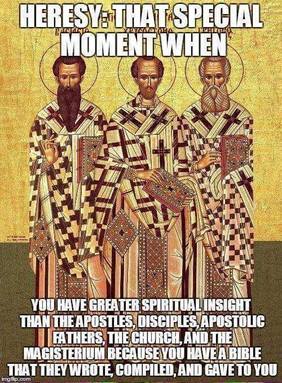 Millennials, we were the ones that started this mess, but I still think they we can figure out how to get out of it. First of all, we need to learn to trust the spiritual wisdom of our elders. Yes, there are some traditions they uphold that are not necessarily founded on Scripture. But many of our elders have been Christians longer than we have been alive. Assuming that you know better than them is arrogant, ungodly, and needs to stop. We need to stop putting words in their mouths that no one really said in the first place just to give us someone to attack (Like when some millennials claim that pastors are always talking about "What's wrong with kids today?", but I have never actually heard a pastor say that. Have you?) The same goes when it comes to understanding or trying to reinterpret Scripture. Don’t fall into the trap of assuming you know better than anyone else. Especially if they have experience. This picture illustrates my point. Secondly, we struggle with a system of religion and rules since most of us feel like we don't fit in. We want to blame on our parents and grandparents generations for creating, but you need to understand that this is not their fault! Many of these flaws have been developing since the church was founded as a result of human misunderstanding, so we should not blame our parents’ generation for it. We need to understand that the church is not perfect, but we still have to learn to be a part of the church at it is right now. We cannot use our irritation with rules and tradition as an excuse to treat the church like it’s an evil sect or cult that we have to disavow for our holiness. Jesus prayed unity among everyone that would come to believe through the message of the apostles (John 17), but in order for Jesus’ prayer to be fulfilled, we have to learn to be a part of a church congregation, no matter how difficult it is. Even if they isn't a college age or young adult ministry doesn't mean that there is no place for you in the church. I have found that the best solution when you find that there are no ministry that are specially for you is to be involved in other ministries as a leader or a teacher, like youth or children's ministries. You will be much less likely to feel out of place in the church if you are intentional about finding ways to fit in. All the generations involved in this discussion have to learn that there are more important things that being right. When it comes to trying to resolve this issue most of the time, we tend to become so passionate about our viewpoint, we sacrifice the importance of relationship for the satisfaction of winning the argument. That is wrong, even if you are right. That is arrogance and pride. The church will never survive if this kind of behavior continues. However, we do have to judge each other in the sense of accountability, not in condemnation or condescension. The most quoted verse in the Bible, especially by the millennials, is Matthew 7:1 “Do not judge or you too will be judged.” However, this verse is almost always taken out of context. We say God doesn’t want us to judge anyone, but we choose to ignore passages like 1 Corinthians 5, where Paul is judging the sexually immoral man and he asks them “Are you not to judge those inside the church? God will judge those outside. ‘Expel the wicked brother from among you.’” (1 Corinthians 5:12a-13, NIV84) God is responsible to bringing everyone outside the church to account. We are responsible for holding each other accountable when we are aware of a significant sin in someone’s life. If we don’t learn to stop arguing to be right and start judging to hold each other accountable, the church will never grow. In fact, the church will probably die on the vine. But if we learn humility in unity, the church will never be the same ConclusionIf we learn how to train children in the way of the Lord, they will make the decision to follow Jesus of their own free will when they are ready. And they will really understand what they are doing. You won’t have to drag them to church. You won’t have to force them to read their Bible or attend youth group. They will want to because they will understand the reason for the hope that they have in Christ. But we have to help them see past the world’s deceptions, stand on the truth of God’s word, how to value their community in Christ, and how to make their relationship with Jesus a personal one. That will be what will get this generation to stay. We need to remind them that we are all the church today. To conclude this post, I want to share my newest spoken word that inspired this post. I hope this video and this post will start the conversations that will lead us to change. But it has to start with us. If you like this video, please like it, leave a comment, and share the video or this post with the hashtag #weareallthechurchtoday. This is a play I did not imagine I would go to see. Most of what I knew about it was that he was a barber that had gone so far off the deep end that he was slitting throats and having their remains made into meat pies to hide the evidence, and that it had really good music. But since I get easily freaked out by blood and gore, I was just not interested. However, when I heard Acting Out Theater Company was going to be doing a production and that I knew some of the people in it, I decided to take the opportunity to go and see it with the desire to learn why this musical has appealed to so many of my peers. One of the people I knew in the show happened to be playing Sweeney Todd, and since Cody’s family goes to my church, I decided to go with them. It was a very hot Saturday to have the show outdoors, but the setting in the heart on downtown Kankakee was very appropriate to the play. It fortunately cooled down by the time the show started around 8pm. When the play was done, I found myself saying that I didn’t dislike it as much as I thought I would, but I wasn’t totally in love with the show either. It was an incredible well done production, but I walked away from the show with more questions than answers. But what I did know from seeing this play is that it shows that both obsession and revenge are dangerous, and when these two feelings are combined, the consequences are often extreme. This is what I saw as the consequences of obsessive vengeance that are played out in the plot of Sweeney Todd. [All the photo used in this post are from Acting Out Theater's Production of Sweeney Todd.] The Value of Human Life Is Down-Played By Selfish Choices Not only does this become the consequence of Todd’s vengeance, but it is the very thing that led him on his path of revenge. A little ways into the plot of the show, you discover that Todd’s real name is Benjamin Barker. He was at one point in time one of the most accomplished barber in all Victorian London. He was married with a beautiful wife and infant daughter. But the unjust Judge Turpin begins to lust after Barker’s wife, Lucy. Wanting Lucy for himself, Turpin has Barker wrongly convicted and sent to prison in Australia. After her husband is arrested, Turpin summons Lucy Barker to his house, sets up a fake masquerade ball to confuse her, and then Turpin rapes her. When Barker finally manages to escape and return to London 15 years later, he has rechristened himself Sweeney Todd and learns that his wife poisoned herself after being raped by Turpin. Barker’s daughter Joanna, who is now a young woman, has become Turpin’s ward. Upon hearing the story of his wife and daughter from Mrs. Lovett (the owner of the meat pie shop below Barker’s old barber shop), Todd is determined to seek revenge against Turpin and his accomplice Beadle Bamford. His plan is to reopen the shop under his new name, lure them to his shop, then use his barber blade to slip their throats. Todd becomes more driven when he learns that Turpin is so determined to “protect” Joanna from the world, he is going to force her to marry him. When the young sailor Anthony Hope accidently reveals that he intends to take Joanna away to elope with her, Turpin has her sent to an asylum to silence her. This accident also foils Todd’s attempt on Turpin’s life and he is so driven mad by the incident that he begins to revenge on all of mankind who wronged him. He starts to slit the throats of many of his customers just to cope, until he finds his next opportunity to get revenge on Turpin. To hide the evidence, Mrs. Lovett conceives of the idea to use the remains of Todd’s victims in her meat pies and selling them to unsuspecting customers. Turpin’s selfish choices devalued the lives of the whole Barker family. Benjamin was reduced to being unjustly imprisoned. Lucy was reduced to feeling like she was damaged goods, leading her to the most drastic choice of all, to end her life. Joanna was reduced to a different type of prison for an unjust reason. All so that Turpin could get what he wanted or cover it up when he didn’t get it. It reminds me of Mister of Judge Claude Frollo in Disney’s The Hunchback of Notre Dame. Not only was he a judge corrupted by his own biases, but his selfishness devalued not only the life of Esmerelda, but also of all the gypsies in Paris. I honestly think that Turpin could have sang the song Hellfire and it totally would have fit into this play. Both Turpin and Frollo has this attitude of “she will be mine or she will burn.” That is disheartening. In the end, Turpin’s selfish choices led to Todd making several selfish choices of his own. Some of it was probably because of mental instability that resulted from his imprisonment, but I think Todd was sound enough of mind to know exactly what he was doing. He was so bend on revenge that the lives he had to end in order to cope didn’t matter to him at all. And the one person that knew what he was doing was encouraging him just boost her business. Although some may give Todd an excuse because of his mental state, Mrs. Lovett doesn’t have that excuse. She didn’t seem to have any more of conscious about it than Todd. She devalued their lives just as much as Todd did by reducing them to pie filling. But in the end, she also had more selfish motivation. This is a powerful reminder what happens when we become blinded by our own selfish ambitions. As a Christian, I never want to devalue any human’s life. No matter who they are, what choices they’ve made, or what decisions they made against me, they are still people made beautifully in the image of God. I never want to force them to do something against their will for or make choices that could end their life for the sake of my ego. We have to be intentional about valuing the people around us, so that we can live out the Bible’s second greatest command: loving our neighbor as ourselves. If only Todd and Turpin would have realized that sooner. Morally Ambiguities Become AmusingYou can probably tell already that this is a very dark play. When the plot is this dark, it is important to interject humor to lighten the mood. However, the nature of much of the humor in this show didn’t completely sit right with me. A lot of humor ends up arising from the devaluing of lives that I just talked about or other actions that make the characters’ morality ambiguous amusing to the audience. Probably the worst example of this is shown in the song A Little Priest. This is when, after Mrs. Lovett suggests using the remains of Todd’s victims in her pies, they sing about what pies of people with different occupations would taste like. They talked about how the priest would taste “heavenly,” and then goes through a long list of others that are reduced to how well their body meat tastes. Even the notion of Todd slitting throats is almost made into a joke by the end of the show. This is all done for the sake of lightening the mood, because it’s hard to find any other way to do it. I think there is a profound lesson to be made from this. Our society wants to give us heroes that are morally flawed and present that as OK. For example, I’ve watch a documentary about how superheroes as we know them exist today. They talked about how comic book readers were getting sick of heroes that they thought were too “one dimensional” because they were too perfect. For example, Superman is so strong, he usually doesn’t struggle with doubts or fears, and he has a high moral code that he usually never breaks. Many heroes, especially the ones created by DC Comics, fit into a very similar mold. Many of the heroes from Marvel struggle more with inner fears and doubt themselves, but many of them still have some sort of moral code that doesn’t break easily. But probably around the ‘80 and ‘90, certain comic book writers began creating character that had moral ambiguities, like Alan Moore’s Watchmen or Todd McFarlane’s Spawn. There were not driven by any code of ethics, sometimes even becoming part crime fighter, part criminal. They were not above killing a villain if they deemed it appropriate. This is what many of the fans were asking for, and when they got it, there were very amused by it and kept asking for more. Again, there is something about this that doesn’t sit right with me. As a Christian, I don’t think moral ambiguities are entertaining or amusing. We should be able to look at the things people do in plays and think to ourselves, “That’s not quite right,” or “That is morally wrong.” Even if the characters aren’t Christian themselves, everyone has some sort of inner moral code they adhere to or follow. We should be able to discern if they are follow their own private sense of morality based on their character and figure out whether their actions are wrong based on their own morals. We should be processing what we are seeing enough that we are aware of it something is right or wrong in what we are watching. Now I think we can laugh or be entertained at certain things that aren’t moral perfect within reason, but not at the cost of ignoring blatant moral problems. If the bad morals portrayed in any form of entertainment don’t send up some sort of red flag in your head, then you may want to rethink your viewpoint. Romance Becomes the Only LightAmidst the darkness of this play, there is only one ray of light: the romance between Joanna and Anthony Hope. Anthony is a sailor who helped rescue Todd from the sea as he was escaping from the Australian prison. When Anthony falls in love with Joanna from afar, he becomes determined to marry her, even though she is Judge Turpin’s ward. He devises a play to break her out of Turpin’s house to elope with her. When Turpin discovers this plan and has Joanna wrongfully committed to an asylum, Anthony stops at nothing until he is able to help her escape. He is aided in his plot by Todd, not knowing that Joanna is really his daughter. But even Todd’s desire to help is ultimately motivated by his unrequited desire to have revenge on Turpin. Anthony and Joanna survive through the end of the play, but the ending of their story isn’t explained. Although it could be assumed that they lived “happily ever after,” I’m sure what they witnessed of the bloodbath at the end of the play would probably haunt them for the rest of their lives. Of all the things I saw in this play, the one thing I found myself enjoying was Anthony fighting to rescue Joanna. He stopped at nothing until he knew she was safe. In fact, Anthony is probably the most noble man in the show. Men that are willing to pursue and sacrifice everything for the women they love are rare. But at the same time, it made me sad to think that this was really one of the only rays of light within the darkness of the plot. Romance is not enough to redeem the plot from all the gore and moral ambiguities. It’s because of this that I found it difficult to love this play as a whole. I enjoyed watching it for its production value, but I didn’t love the plot as a whole or where it ended. Other Things I Noticed in Sweeney ToddThere were a few things that stood out positively: Production Quality - As far as the production I saw, the quality of the sets, the costumes, the singing, and the acting was top-notch! Cody did an incredible job playing the extremely difficult part of Sweeney Todd. It happened that the guy that played Judge Turpin played the part of Bert when I was in Mary Poppins last fall! I also knew a very members of the ensemble. These guys and the whole cast are incredible talented. Well done! Compelling and Complex Music - One of the things that I did know about this play before seeing it was that it had really good music. I had some music major friends in college that loved the music and one or two guys that even sang songs from it in their recitals. Now, after having experienced the music within the content of the play, I can see why some people are so drawn to it. Because I watched this production, I now realize how incredibly difficult the music is. It is very complex, and not for the faint of heart. I heard that Cody said it was some of the most complex music that he has ever done. That’s saying a lot, because one of his last starring roles was playing Javier in Les Miserables! Although the messages within the songs are not my favorite, the quality of the music itself cannot be denied, as well as the talent it takes to perform the music well. There are several other negative things to note: Violence/Gore – Part of me had a false expectation that this show was going to be showing blood every 2 minutes. Although that may not be the case, it is still a pretty violent show. You see at least 6 different throats slit on stage, in which you see blood from the cut on the victim’s throat as well as coming out of their mouth. But much the actual death of these characters is left to the imagination when after their throat is slit, Todd drops their bodies from his barber chair through a trap door that leads to Mrs. Lovett’s basement. You hear the sound effect of a man breaking the neck of a little bird. Another character is shot, but you don’t see any blood. There was at least one scene where you see Mrs. Lovett tossing body parts into her oven. Eventually, you see a whole person thrown into the oven. These reasons alone are enough to keep any child from seeing this play. Language – There is language sprinkled throughout the play. The moment where it felt the most excessive is when Todd is describing Pirelli’s fake hair elixir as smelling and tasting like urine, calling it p*** several times in a row. Although that was only specific instance of language of which I took note, there were a number of other small instances of language used throughout the play. Sexual Content – You see a reenactment of Judge Turpin raping Lucy Barker during the fake masquerade ball at his house. There are people dancing around them, but you can see him on top of her. There is a beggar women who appears throughout the show who often hikes her skirt up to get attention. Also, at the end of the song Kiss Me (Part 2), Joanna and Anthony enter her room together in a way that could imply that they were about to sleep together. There also seemed to be a few mild innuendos throughout the dialogue. Deception – There is a lot of deception going on the part of Todd, but the most deception happening in the show is from Mrs. Lovett. She lies to Todd to hide a major secret from him, mostly because she’s in love with him and it eventually helps boost her business. I don’t want to give it away if you haven’t seen the play, but when her deception is exposed, it has severe consequences. Obsession And Vengeance Have Serious ConsequencesThe main thing that I gained from seeing Sweeney Todd was a better understanding of the dangerous consequences of both obsession and revenge. I was given permission to share some of the thoughts from Cody Marcukatis, who played the part of Sweeney Todd, about what he learned about the nature of obsession through this character. This was portion of a much larger Facebook post he wrote about his experience: “Obsession alters your perception.” “I wanted everyone to see what could become of you if you let obsession rule you.” Wow. That’s powerful. I was totally taken back by Cody’s insight into the consequences of obsession. I think this is a powerful lesson for anyone to learn. Personally, I tend to have a passionate personality than can easily become obsessed if I am not careful. If I am into something, I am all in. But I know as a Christian, if I become too interested in something to the point that it diverts my attention away from loving God or loving others as I should, then I have become obsessed. Now, I’m beginning to realize how true it is that when I became obsessed with anything in my life, my perception was altered, as was my ability to be objective. That is a dangerous place to be. I am grateful to have a reminder what letting obsession rule me can do, thanks to the authenticity of Cody’s performance. I am also reminded of the consequences of taking revenge against those who have hurt us. As I was looking through the program for Sweeney Todd, I was compelled by the notes of the staging director, Jerry Cohagan. He posed two powerful questions, “Can vengeance ever lead to salvation? Even if the answer is no, then why do we seek it?” As a Christian, I believe the answer is no, vengeance cannot lead to true salvation or liberation. And the reason we seek it out is because it not seeking it out would require letting go of our bitterness and choosing forgiveness. This is much more demanding for those of us that have been wronged. It seems so much easier to take justice into our own hands. But I serve a God who instructed me not to seek out revenge. He said, “Vengeance is mine, and I will repay.” (Deuteronomy 32:35) God will be the one to seek vengeance against those who hurt me or hurt others without repentance. He will carry the burden of our anger, bitterness, and hatred so that we don’t have to, if we choose to forgive. Otherwise, our bitterness will steal our joy, our faith, our loved ones, our ability to reason, and even end our lives if we let it consume us. I want to be sure that never happens to me. I hope the same is true of you. In conclusion, although I disliked the violence of the play, I am so grateful to have had the experience of seeing Sweeney Todd. It is a thrilling tale full of suspense and violence, but it is a powerful reminder of what happens if you let obsession, vengeance, and selfishness rule your life. Although I probably won’t see the show again, I am glad I had to opportunity to learn these lessons. I hope you have learned something too. Content Ratings I can’t believe it’s been five years since the tornado hit Joplin, Missouri, killing 160 people and destroying a main portion of the city. Joplin was the town I called home while I was in college. It’s crazy to think that I left Joplin 28 hours before the tornado hit. When I left to go home for the summer, I never would have imagined how different the city would look when I would return just three months later. I could have never guessed that my sister and her husband, along with several others, would survive the tornado in the basement of their church when the sanctuary went. And I would have never imagined that a girl that had been in choir with me in college (Natalia Puebla) would lose her life in the storm. It was one of the hardest things I ever had to witness, even from a distance on the news, because it was very personal. However, as I look back, I am amazed at all that God taught me from that difficult time. On the fifth anniversary of this catastrophic event, I wanted to share three of the biggest lessons I learned from the Joplin tornado. The Tornado Gave Me A Context to Sympathize with Other Tragedies Have you ever had anyone ask you where you were on 9/11? All of us that were old enough remember it. I remember where I was and what I was doing. I remember the reactions of everyone around us. I remember the fear and uncertainty that seized all of our hearts. As I look back on that event, I remember that it seemed personal because it was country I lived in. But in the end, it really wasn’t that personal. After all, I had never been to New York City or knew anyone that had been in the Twin Towers that day. All that I had seen was new footage. That’s the way it was for the majority of Americans. It seemed personal, but it really wasn’t as personal as we thought in certain respects. It was often the same way with natural disasters like Hurricane Katrina. We felt bad for the people that were suffering, but it wasn’t personal because we didn’t know how to identify with that kind of destruction and loss. It’s hard to relate to something you don’t understand. At least until it happens to you or people you love. The Joplin Tornado completely changed my perspective on catastrophic events, like 9/11 and Hurricane Katrina, because it gave me a context with which I could sympathize with their suffering. Although I was not in Joplin when the tornado hit, it was hard to watch the town I called home destroyed. It was personal and it was heart-breaking. People died in the Wal-Mart where I shopped dozens of times, as well as other stores and restaurants I frequented. I could have just as easier been in any of those places when it hit. As often as I am asked about where I was on 9/11, that question also makes me think about where I was on 5/22, and I remember to use those difficult memories as an opportunity to sympathize with those that face similar situations. The Tornado Proved That God Protected So Many LivesOn one hand, it was so hard to personally witness all the destruction that happened because of the tornado. It grieves me to think about how many people lost their lives in the storm and how many more suffered the loss of homes and businesses because of it. But on the other hand, I got to hear so many eye witness accounts of how God protected so many people. In many cases, I got to hear them firsthand. Here’s just a few examples: - My sister and her husband were preparing to start a meeting about that summer’s VBS program in the church building, along with several other people from their congregation. When the sky turned green and the sirens sounded, everyone ran for the basement. A few of the men, including my sister’s husband, quickly checked to make sure everyone was downstairs. He was the last one to make it back downstairs before they closed the door. One or two other men didn’t make it to the basement, but wedged themselves behind the refrigerators in the kitchen. In the end, everyone in the building was safe, but the sanctuary was destroyed, which was the place where they were supposed to be having their meeting. When my mom first told me about the tornado, before I saw any news footage, she told me that they had already heard from Jenn (thanks to Verizon’s cell phone service) and that they were both OK. - I knew a few people that were in Wal-Mart when the roof was lifted off. One couple I knew was saved by a shelf buckling over them and protecting them. Another man I knew, an employee of my college, saved his wife and daughter by encamping themselves in the middle of a shopping cart ring. - So many people I knew lost their apartments, but were somewhere else like their job or their church that night. There were also several businesses that were not open that night because it was Sunday, which saved more people. - One of my favorite stories included a friend of mine who had just graduated and was very pregnant. She was in her apartment with her parents when the storm hit, and the only place they had to hide was the hallway. Two things happened: first, the wall of the hallway tented around them, protecting them. Secondly, despite all the debris that was flying around and the high winds, no one single thing hit her belly. - Despite all the destruction, despite the fact that it tornado when through residential and commercial areas of the city, despite all the odds, only about 160 people died in the storm. Yes, it still grieves me that 160 died, don’t get me wrong. But only 160 died, despite all that destruction. That’s was God’s protection around Joplin, Missouri, and I got to witness it firsthand The Tornado Taught Me About the Power of Community in Times of DistressProbably just as powerful as witnessing God’s hand of protection during the tornado was witnessing the community and support that happened after the tornado. What others did to help the city of Joplin was an incredible thing to behold. My college (Ozark Christian College) and many of the churches in Joplin had the opportunity to be the hands and feet of Jesus in such a blatant, tangible way. Many of these places became the distribution centers or were able to help provide temporary housing. Some eventually helped sponsor the rebuilding of houses. But in the end, everyone in Joplin had to step up their game in order to rise above their circumstances. They had to help each other achieve this goal, with the help of many outside of Joplin that stepped up to make a different and fulfill the needs of many who were in distress. Many of those that stepped up to help did so with the greatest of humility, while others lacked it. Seeing all of this was such a powerful reminder of how important it is for us as Christians to help those who are in distress and to do so with a genuine desire to serve. This was shown most powerfully when my home church brought a group down to Joplin that October for a mission trip. What was so interesting about it was that there happen to be there at the exact same time as Extreme Makeover: Home Edition was there building seven houses and rebuilding Cunningham Park. It was interesting to see how much recognition and attention this show was drawing to what they were doing. Don’t get me wrong, what they did was awesome and I even had some friends that were able to volunteer on the building crews. But in the end, it was presented as a TV show, with the intention of making it emotional for the audience and bringing the glory back to themselves. However, the group from my church was a different story. All there did was help make progress on the rebuilding of two houses and do some work in one of the distribution centers. In the grand scheme of work that still needed to get done, there didn't make a huge dent. But their humility in what they did was incredible. I was so proud of my dad and the team he led as they acknowledged that everything they accomplished on that trip was to help others and bring the glory back to God. Final ThoughtsAs I look back, I realize that there was a lot of things that I didn’t respond to as well as I wish I had at the time. The tornado was so unexpected and the scale of the destruction was so large that it was difficult to process. Much of my initial response was selfishly motivated. But out of all the things I’ve observed, one thing still stands out: God made beauty out the ashes of Joplin, Missouri. It makes me think of the song Beauty Will Rise by Steven Curtis Chapman. This song was written when he lost his five-year old daughter. If you haven’t listened to it, you can listen here: This song applies to this tragedy in so many ways. But one of the lines of the songs that stands out to me is: It will take our breath away/To see the beauty that He’s made out of the ashes. I am now only now beginning to get a sense of the incredible masterpiece He is making as a result of what happened in Joplin on May 22, 2011. And it is beautiful. Yes, it was created through people’s brokenness and suffering, but all of it is being made into something more beautiful than any resident of Joplin could have ever imagined. We are only going to get a taste of that masterpiece while we live here this side of heaven. It’s in moments like this that I can’t wait to get to heaven, so I can see the completed masterpiece. I hope that you have come to understand it better through this post.
This blog post is an essay that I am planning to submit for a book being written about my alma mater, Ozark Christian College. They are collecting stories from 75 years of lessons learned from this school. Honestly, I feel like I could write a book about the lessons I learned while I was a student at OCC, but this is the one that was laid most heavily on my heart. I may write other essays like this in the future if others will find value in this. Maybe, you will see this essay in the book sometime soon. If any of you were a part of this community I’m talking about, thank you. ________________________________________________________________________________________________ One of the lessons I learned throughout my time at Ozark was how to live out life in genuine Christian community. I remember being specifically taught during Spiritual Formation Retreat in January 2013 about how essential it is to live our lives in the context of the body of Christ. Before this retreat, I had not realized how important this concept is to our spiritual lives. Although there are several verses in Scripture that describe community or instruct us how to properly live in community, one verse stands out above the rest in my mind: “Rejoice with those who rejoice; mourn with those who mourn.” (Romans 12:15, NIV84) This verse seems to bookend my memories of community at Ozark in so many ways, especially my last two semesters. We often rejoiced with those who rejoiced while I was at OCC. We would rejoice as a campus when we all received the text that informed us that classes were cancelled (usually because of snow), especially when it happened more than one day in a row. We would rejoice as a dorm floor when one of the girls announced she was engaged. We rejoiced over someone’s birthday (On Goodman 3rd [my dorm floor, also known as G3], this included writing affirmations for the birthday girl on the mirrors in the bathroom and decorating the door of their room with toilet paper). We rejoiced whenever someone hit a milestone in their Ozark career, like when they completed their Principles Project or their Theological Integration Paper. As a music major, we rejoiced when we completed juries, recitals, or the Living Christmas Tree. We rejoiced whenever someone had plans for their future confirmed. And we definitely rejoiced when we watched our friends receive their diplomas and graduate from OCC. In those moments, the joy was all the more genuine because it was mutual. In many of those moments, G3 even made the habit of singing Doxology as part of our rejoicing. This is because we saw God’s hand in the joy we shared. But there were also moments that we mourned with those who mourned. We would help each other bear grief or get through difficult seasons of life, simply by being there for each other. Sometimes, you just needed someone to listen when things were getting difficult. Other times, you were the one that needed to do the listening and offer your shoulder to cry on. On G3, it seemed that if you were going through something, you could literally walk out into your hallway and walk into any room to ask for advice or comfort. Even if you may not have been super close, the girls on my floor would probably have dropped anything to help each other if they needed it. Some of those moments of turning to others for help were so beautiful and powerful. But there was one instance in which together, our whole campus learned what it truly means to mourn with those who mourn. When our friend and fellow student Brandon Stuckey passed away in a car accident on February 6, 2013, we had the opportunity to live this out. Many of us stood outside of Boatman dorm for hours that night. We sang songs about comfort, peace, and heaven. We prayed for his family, his friends, and his dorm brothers on Boatman 3rd. But most importantly, we comforted each other in our tears. Even though we were all hurting from this loss, we declared together that we would trust the Lord, even in our grief. When we are bearing such extreme or sudden sorrow, we are called to cry with our brothers and sisters, to help bear the burden of their pain. Although that was one of the hardest nights on my life so far, I cherish the bittersweet memories of community. In fact, I remember that another student posted on Facebook, “Tonight, the term ‘Christian community’ was defined.” I agree. [This is not part of the essay, but this video is a spoken word poem I just released this month about the experiencing of losing Brandon. It specifically talks about Christian community and mourning with those who mourn] Because of these and other experiences, I believe that the term “Christian community” was defined not just that night, but throughout my whole experience at Ozark. Much of the other experiences I had fell somewhere in between the two extremes of sharing great joy and sharing extreme pain. But through all the highs and lows, I learned that the place where we find the best community is in the place where those that surround us are willing to identify with us, regardless of our current emotional state. Through that, we learned many of the other concepts about genuine community in Christ that are also listed in Romans 12, like be devoted to one another in brotherly love (vs. 10) or doing what we can to live at peace with everyone (vs. 18). We had the opportunities to live these out every day in the context of community in Christ. It was something that on one hand I loved while I was in school, and on the other hand I took for granted while I was a student, especially my first few years. After I went on Spiritual Formation Retreat, I made more intentional efforts to build community and to get to know more people on campus. And it made my experience my last two semester all the richer. I definitely missed that when I completed my internship my last semester as a student, but it also made me more intentional to seek out community at the church where I interned. This, again, make my experience all the richer.
As I remember the community we fostered at Ozark, I praise God that He brought me to OCC, so that I could learn what genuine community looks like. This way, I can help others seek it out for themselves, both within their own churches and within the body of Christ as a whole. I hope anyone else that reads this story will be inspired to do the same. |
Lion's Eyes Reviews is a blog dedicated to reviews of Christian books, most of which are non-fiction, but may also occasionally review movies and musicals. It will also feature the work Bethel does to help launch and promote the works of Christian authors.
The name is derived from one of Bethel's favorite books, Through the Eyes of a Lion by Levi Lusko. Through these reviews, Bethel hope to give Christians the tools they need to look at the world "through the eyes of a lion" so they can find the courage to "run toward the roar". To find the detailed archives of these reviews, you can check them out here: Books In Review Movies in Review Broadway In Review Quick Reviews To understand the rating used in these reviews, click here Categories
All
Archives
May 2024
|
|
Bethel Grove is a Christian young woman who loves to read and write, eat Reese's Peanut Butter Cup Blizzards, and disciple teen girls as a youth leader. What started as a hobby of writing book reviews and doing deep biblical studies eventually led her down the path of self-publishing and helping other Christian authors launch their books. She hopes to someday be a vocational youth minister and well-known author.
Follow AUthor Bethel Grove
|
Receive This eBook for FreeSign up for Bethel's newsletter to receive monthly updates for Abiding Grace Ministries, and you will receive a copy of this exclusive eBook for free
|


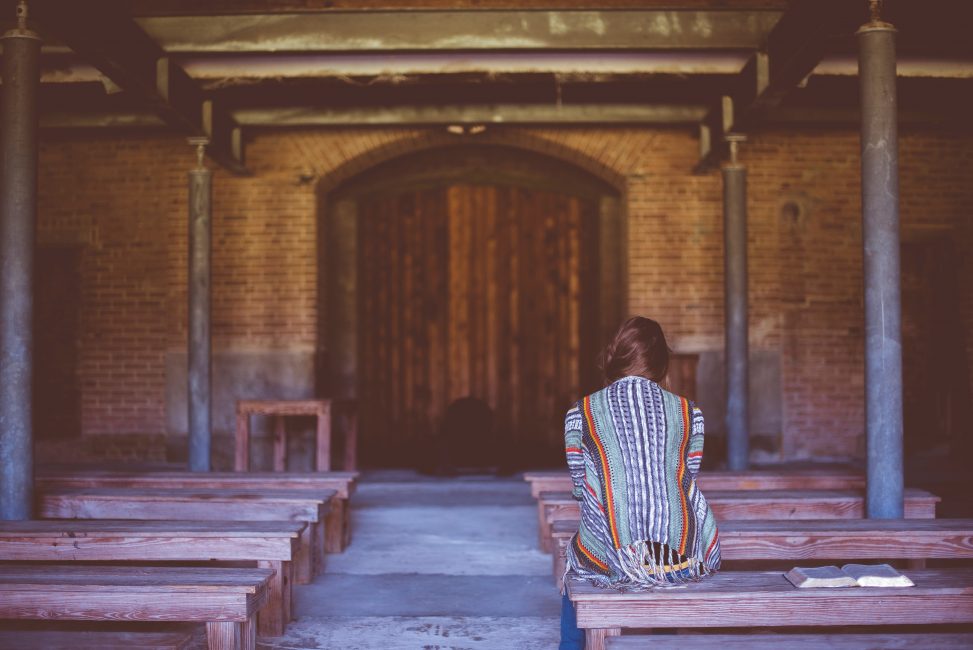
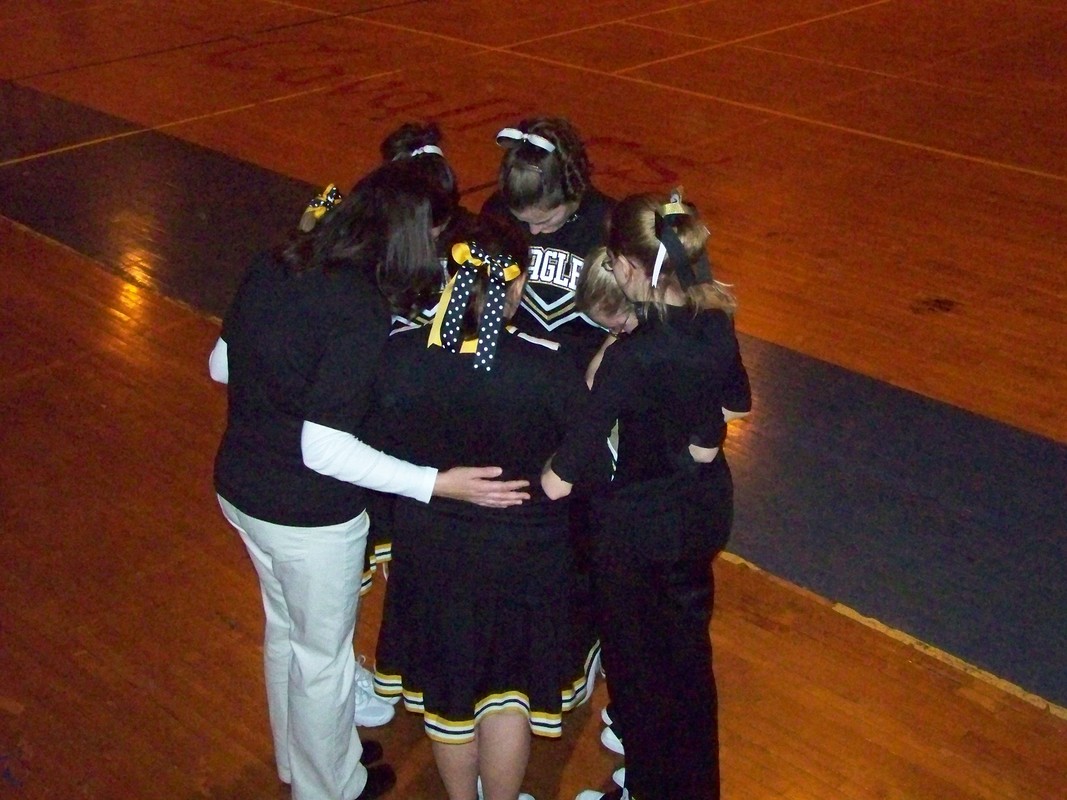

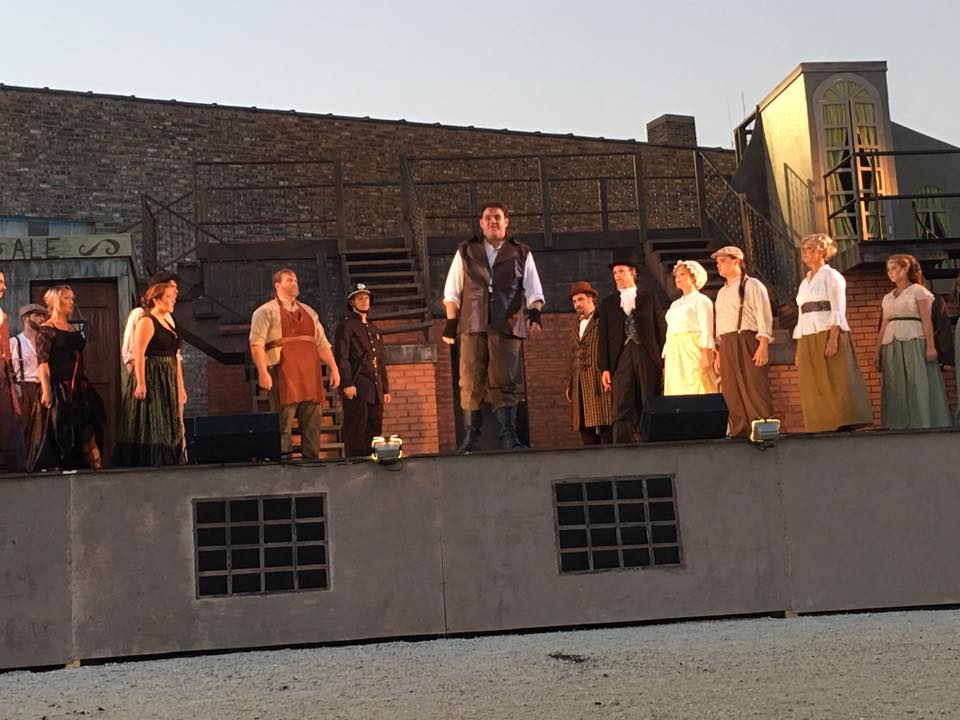
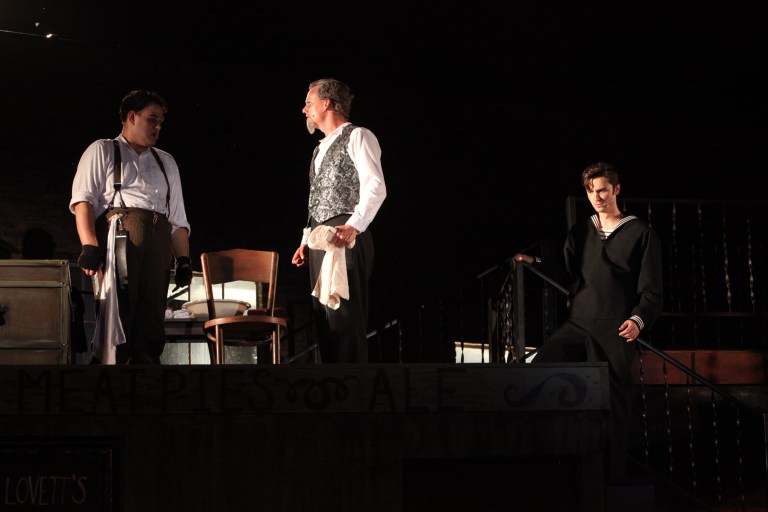
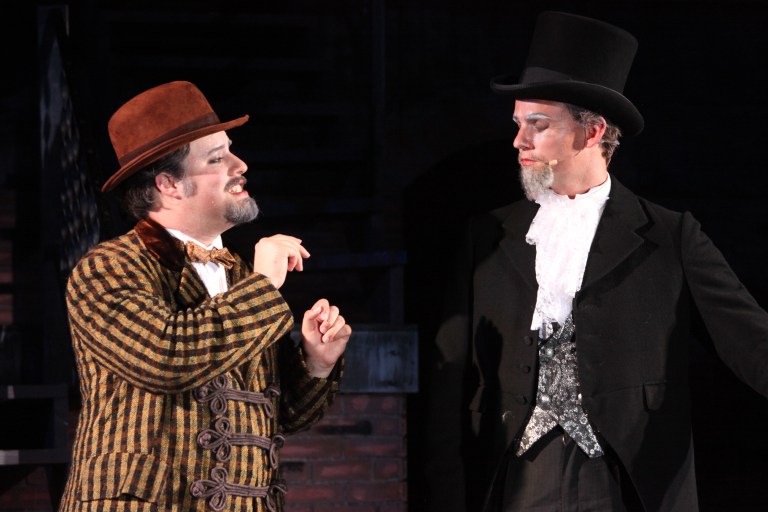
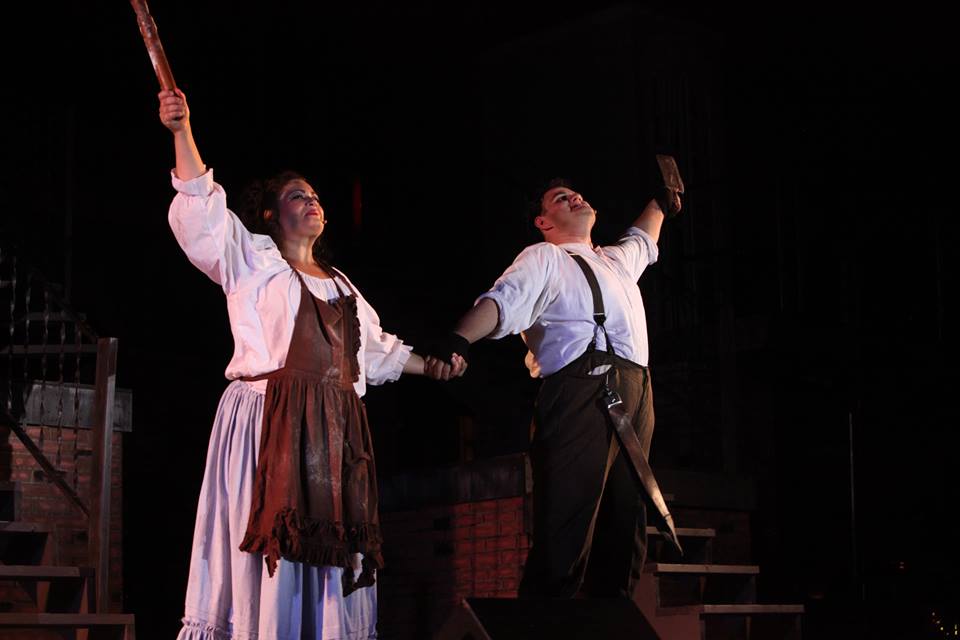
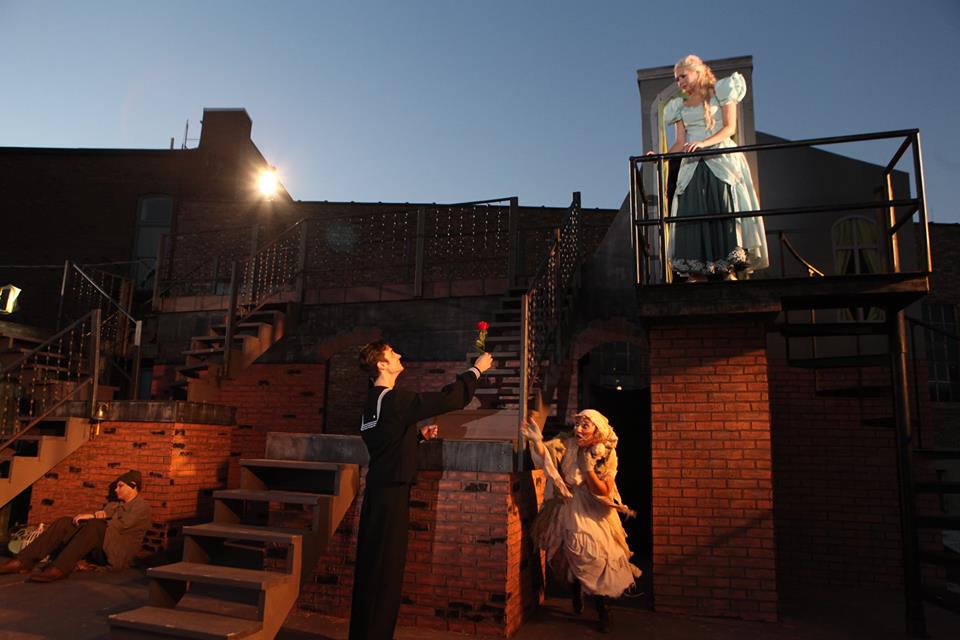
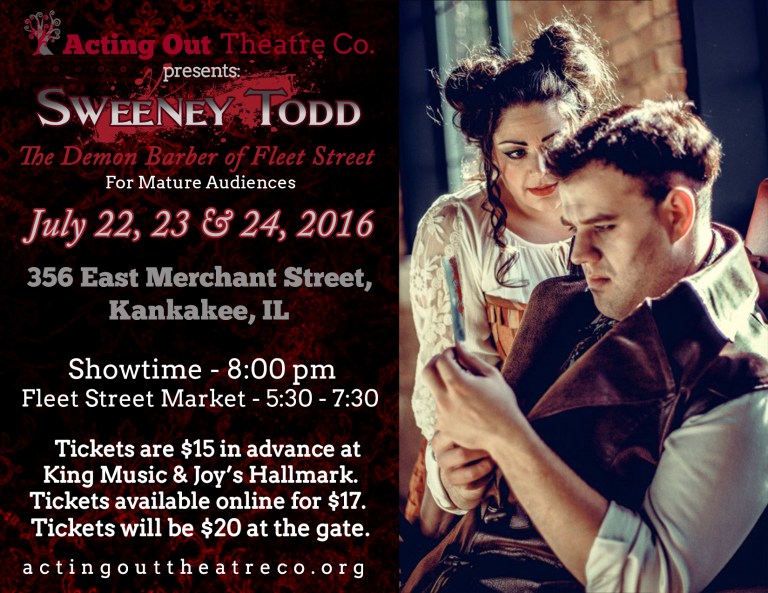
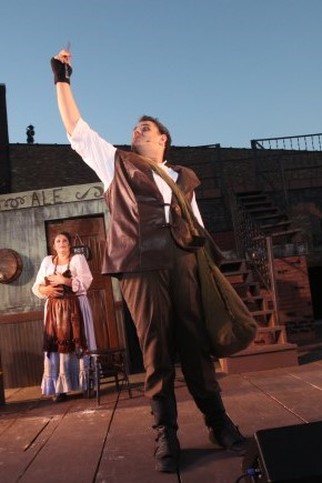
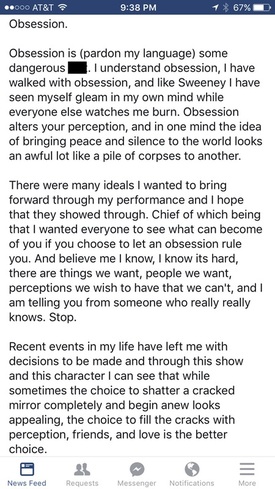
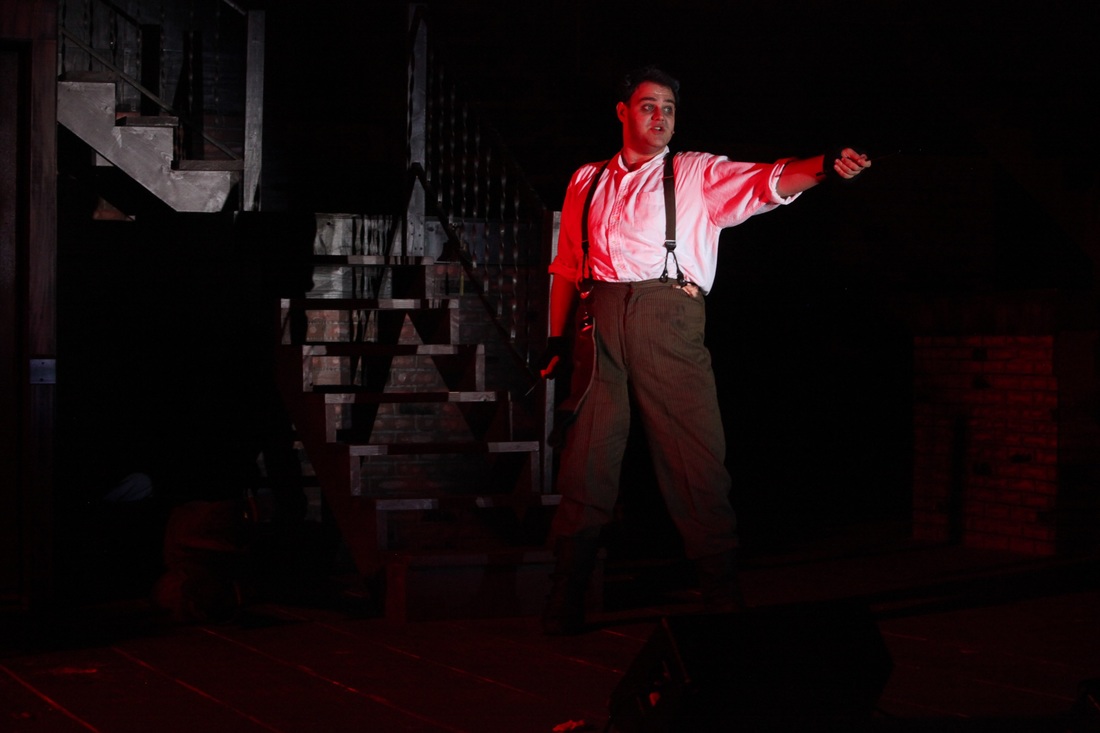












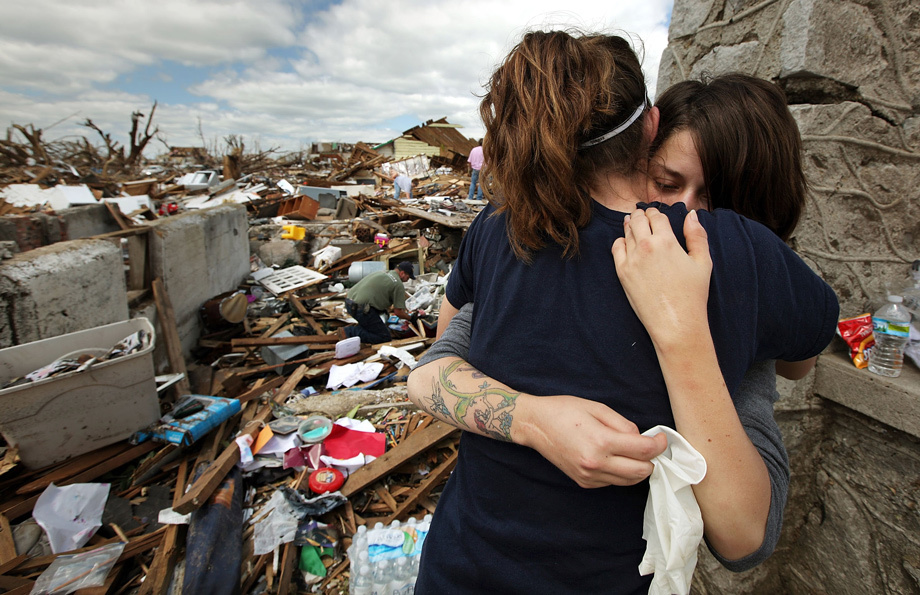

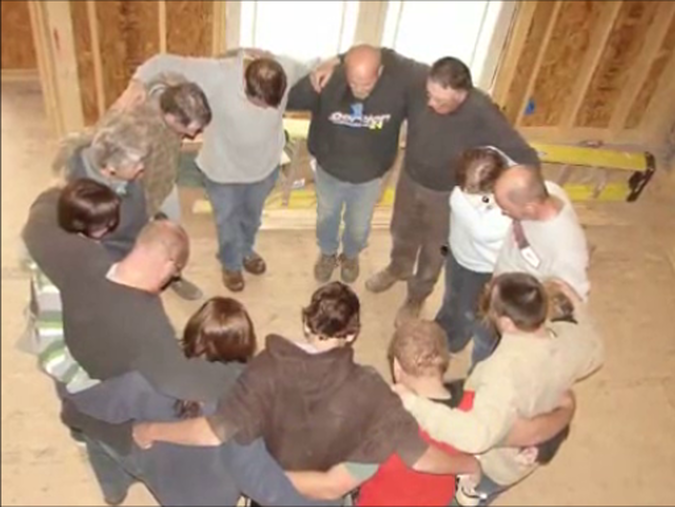
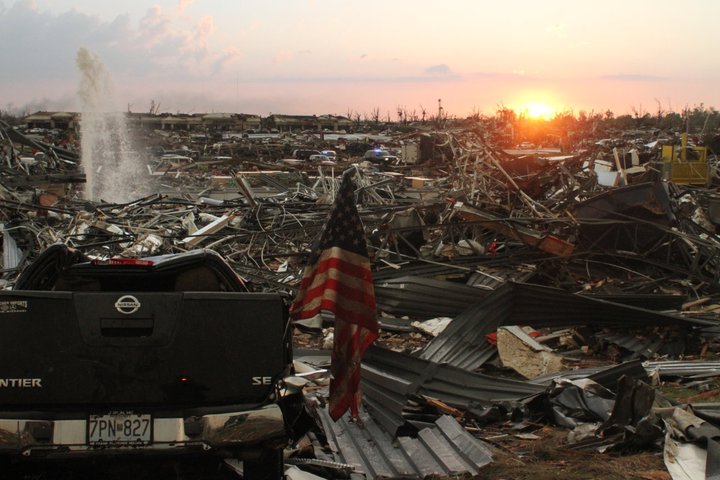
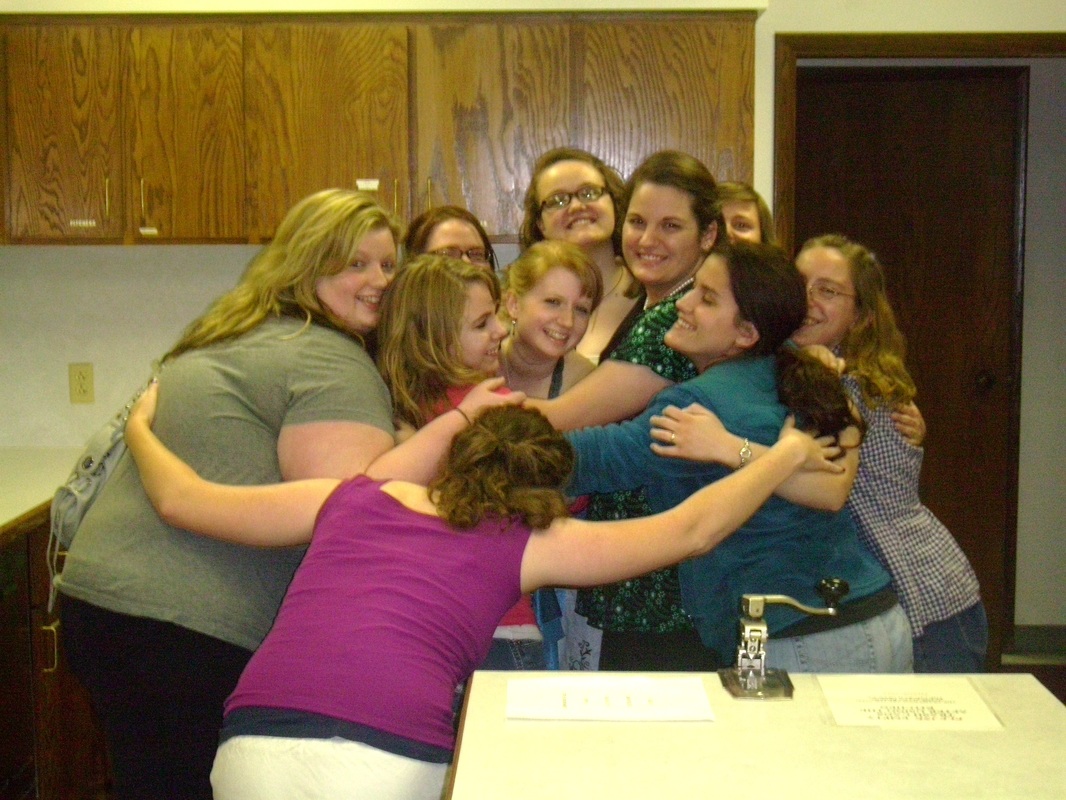
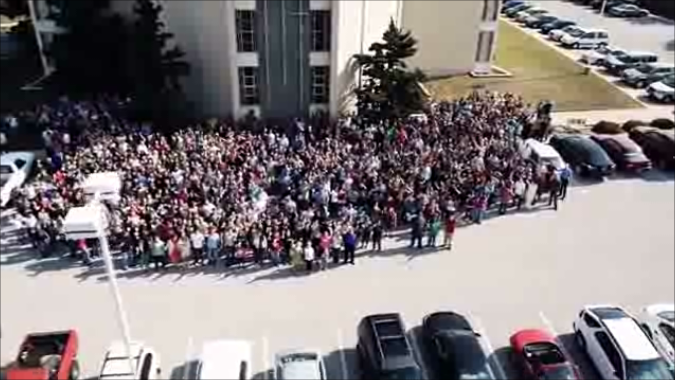

 RSS Feed
RSS Feed

